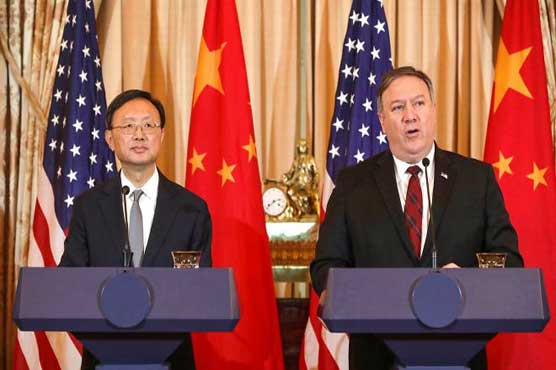In Hawaii, US and China assess path forward from tensions

The two nations have kept the talks under wraps, with no formal announcement and media not allowed
WASHINGTON (AFP) - US Secretary of State Mike Pompeo, a vociferous critic of China, is meeting quietly Wednesday in Hawaii with a top official from Beijing which is hoping to ease skyrocketing tensions.
It is the first high-level meeting between the two powers since the coronavirus pandemic -- which President Donald Trump has sought to blame on China, increasingly his villain of choice ahead of the November US elections.
Pompeo is meeting in Honolulu with Yang Jiechi, a veteran Communist Party official who reportedly requested the talks amid global tumult.
The two nations have kept the talks under wraps, with no formal announcement and media not allowed. The State Department confirmed the meeting merely with a mention on Pompeo s public schedule, saying he would meet Yang at 1900 GMT.
Susan Thornton, a career diplomat who served as the top State Department official on East Asia earlier in the Trump administration, said that US and Chinese leaders can "jointly save lives and save our economies" -- but doubted the Hawaii talks would do so.
"I hope that this meeting will reduce tensions, and I suspect that s why the Chinese suggested it, but I am skeptical that this will be the outcome," said Thornton, now at Yale University Law School.
"My own view is that the United States and China both face serious crises, as does the rest of the world from COVID-19 and the consequent economic meltdown," she said.
"It seems to me that talking about US-China rivalry in this environment is out of touch with the reality that people are facing."
Polemicist to the rescue?
Pompeo, a stalwart ally of Trump seen as having presidential aspirations of his own, has been in the forefront of denouncing China, saying it is "truly hostile" to the United States and "ruthlessly imposes communism."
The conservative former congressman has taken the lead in promoting a theory, discounted by mainstream scientists, that the coronavirus came out of a Chinese laboratory.
Michael Swaine, a prominent US scholar of China, said Pompeo is "about the worst person" to be in charge of decreasing tensions.
"He has shown that he has zero understanding of China, and is mostly a polemicist," Swaine, a senior fellow at the Carnegie Endowment for International Peace, wrote on Twitter.
"Making ideological statements as if they constitute diplomacy or some kind of strategy is just embarrassing for the US."
But it would be difficult for Pompeo to reject a request from Yang, who is brushing aside protocol with a willingness to meet on US soil outside of Washington.
Yang, who has long been active in shaping China s relationship with the United States, similarly met quietly with Pompeo in New York in August.
Tensions had been boiling between the world s two largest economic powers even before the pandemic, with Trump slapping tariffs on billions of dollars of Chinese goods, accusing Beijing of rampant theft of US intellectual property.
The two nations have since been at loggerheads over Hong Kong, with Pompeo declaring that the former British colony is no longer autonomous in US eyes as Beijing moves forward on a tough security law that could criminalize dissent.
Trump is also expected to soon sign into law an act that authorizes sanctions over China s detention of more than one million Uighurs and other Turkic Muslims.
Activists say China is forcibly homogenizing minorities in a brainwashing campaign with few modern precedents. Beijing counters that it is running vocational educational centers that offer an alternative to Islamic extremism.
China has hit back at criticism by highlighting abuses by US police, an issue that has triggered global protests after a white Minneapolis officer killed George Floyd, an unarmed African American who was seen on camera pleading for his life.
Whether the United States and China reach any rhetorical truce could become clear quickly. Pompeo is set to speak Friday at a Danish forum, where the State Department says he will discuss "threats to democracy around the world."

